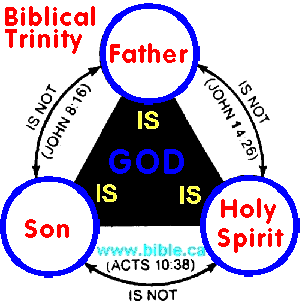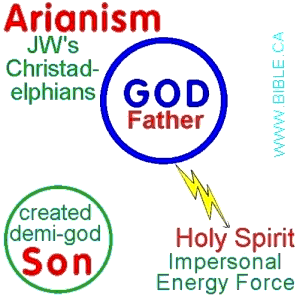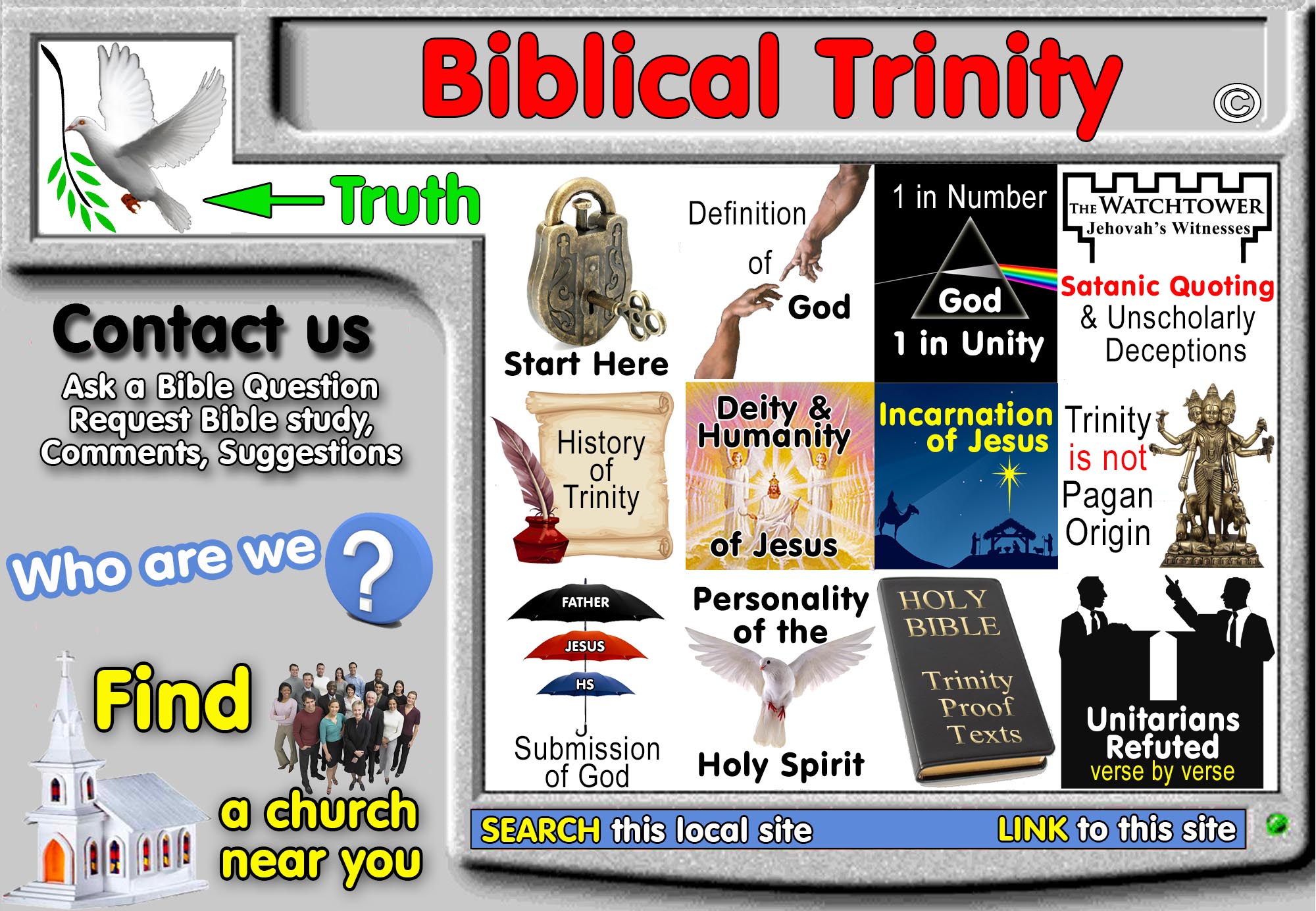|
|
|
|
Anti-Trinitarian faulty argument #1 |
By way of Hebrew Parallelism, where the same thing is repeated twice in different ways for emphasis, "Jesus" is the "angel of God". That Jesus is outright called an angel in this passage is clearly seen in the phrase: "you received me as [Gr: HOS] an angel of God, as [Gr: HOS] Christ Jesus Himself." The text describes Jesus first as an angel, then names him. |
|
Anti-Trinitarian argument #1 refuted |
The parallelism in Gal 4:14 is not that Jesus is an angel, but that the Galatians treated Paul AS they would treat an angel and AS they would treat Jesus Christ. We do not dispute that there is a parallel being made, but to conclude that Jesus is an angel because of the parallel is simply wrong. The Bible is filled with "Hebrew Parallelism" where the two things being paralleled are different:
- Here we have a remarkable three way parallel just like in Gal 4:14. If Gal 4:14 proves Jesus in an angel, then Zech 12:8 proves Jehovah is an angel! "In that day the LORD will defend the inhabitants of Jerusalem, and the one who is feeble among them in that day will be like [HOS LXX] David, and the house of David will be like [HOS LXX] God, like [HOS LXX] the angel of the LORD before them." Zechariah 12:8
- Here the quality of knowing good and evil and being wise is shared between the king, the angel and God himself! 2 Samuel 14:17,20 "Then your maidservant said, 'Please let the word of my lord the king be comforting, for as the angel of God, so is my lord the king to discern good and evil." ... "But my lord is wise, like the wisdom of the angel of God, to know all that is in the earth."(Although God is not mentioned in the text, he certainly is wise and knows good from evil.)
- Here the quality of taking life is shared between the king, the angel and God himself! 2 Sam 19:27 "Moreover, he has slandered your servant to my lord the king; but my lord the king is like the angel of God, therefore do what is good in your sight."
- Rain is not dew: "Let my teaching drop as [LXX: HOS] the rain, My speech distill as [LXX: HOS] the dew, As [LXX: HOSEI] the droplets on the fresh grass And as [LXX: HOSEI] the showers on the herb. Deut 32:2
- Grass is not an herb: "For they will wither quickly like [LXX: HOSEI] the grass, And fade like [LXX: HOSEI] the green herb.' Ps 37:22
- Sodom is not Gomorrah: "Unless the Lord Almighty had left us descendants, we would have become as [Gr: HOS] Sodom, we would have been as [Gr: HOS] Gomorrah." Rom 9:29; Isa 1:19
|
|
|
|
|
Anti-Trinitarian faulty argument #2 |
The BAGD Greek Lexicon states of the word HOS (HOS looks like "WS" in Greek alphabet), " introduces the characteristic quality of a pers., thing, or action, etc., referred to in the context." BAGD uses 1 Cor 3:1 as an example parallel in use to Gal 4:14. (BAGD; A Greek-English Lexicon of the New Testament and Other Early Christian Literature, Bauer-Arndt-Gingrich, HOS, p 906, section III) Therefore, |
|
Anti-Trinitarian argument #2 refuted |
- There are three different definition uses of HOS listed by BAGD. Gal 4:14 is not even listed anywhere in the extensive article by BAGD. It is deceptive not to mention this, but more to only quote one of three possible definitions then IMPLY that Gal 4:14 is within that one definition. Sections I: "as a comparative particle, indicating the manner in which someth. proceeds as, like" ... Sections II: "as a conjunction denoting comparison" (BAGD, HOS, p 906, section I & II) If BAGD did classify HOS, it may in fact have been placed in sections I or II, we will never know. But the point is, BAGD doesn't specifically classify the use of HOS in BAGD so the quote is deceptive.
- The attempt to parallel Gal 4:14 with 1 Cor 3:1 is wrong because first, because the parallel is both superficial and not relevant to the context of Gal 4:14. But second, because BAGD dosn't even list Gal 4:14! Other lexicons that do list both verses list them in different categories. Thayer's Lexicon, for example, DOES list both passages, but under different categories! 1 Cor 3:1 emphasizes the quality of a person, thing (HOS section 2d). Galatians 4:14 is listed differently where "an accusative governed by the verb". (HOS section 2a).
- The Corinthians really were babes in Christ, but Paul is not really an ontological angel (like Gabriel). Paul is emphasizing how they received him not what he really was. He was neither an angel nor Christ Jesus in reality. But the Corinthians WERE babes in Christ in reality (unspiritual)..they didn't just act like babes in Christ, they didn't just function like babes in Christ, they really were. That's why these two passages are not listed under the same emphasis in either Lexicon.
|
|
|
|
|
Anti-Trinitarian faulty argument #3 |
Paul, angels and Jesus share the quality of being messengers. Because Gal 4:14 indicates that Jesus functioned as an angel, HE IS AN ANGEL, a and therefore creature. |
|
Anti-Trinitarian argument #3 refuted |
If Jesus merely functioned as a "messenger" the word SENT in the gospel of John is more powerful than Gal 4:14. |
|
|
|
|
Anti-Trinitarian faulty argument #4 |
Gal 4:14 shows Paul, angels and Jesus all functioned as divine messengers. The Father never functions as a divine messenger. Divine messenger is a role only creatures perform. |
|
Anti-Trinitarian argument #4 refuted |
- The three way parallel in the context of Galatians 4:14 is not about functioning as a messenger at all, but accepting Paul with the same honor and respect as an angel or Jesus.
- God has functioned many times as his own divine messenger, does that make God an ANGEL? The giving of the Ten Commandments directly to Moses and the voice from heaven, "This is my Son" in the Gospels are just a few examples of God functioning as his own divine messenger, or ANGEL if you like.
- If I asked God to function as MY messenger that doesn't make Him a created angel. For example I could ask God in prayer, "Father, please tell Jesus I really love him!" Is it impossible for God to relay a message? Obviously not. So the Arians have no point at all!
|
|
|
|
|
Anti-Trinitarian faulty argument #4 |
Gal 4:14 merely shows that Jesus shares one quality of an angel, a messenger. |
|
Anti-Trinitarian argument #4 refuted |
- Yes a quality is shared, but what is that quality? The text does not mention or use the quality of a messenger. The quality shared in Gal 4:14 is the "reverence, awe and respect" that accompanies seeing an angel, or being in the personal presence of Jesus Christ. This same type of "reverence, awe and respect" is present when you are in the personal presence of a National head of state, celebrity or billionaire. You must use the context to determine what the shared quality is for each text.
- God and men share many qualities together but that does not make God a creature or man an angel!
- The Jews, David, God, and an angel share the quality of strength in Zech 12:8
- The king and the angel share the quality of knowing good and evil in 2 Samuel 14:17,27.
- The king and the angel shared the ability to take life in 2 Sam 19:27
- Paul, an angel and Jesus Christ shared the quality of being treated with reverence, awe and respect, when in any of their personal presence's in Gal 4:14. And that my friend is the simple meaning of the text!
|
|
|
|


